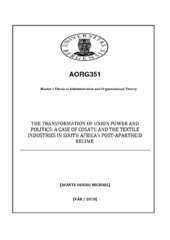The transformation of union power and politics: a case of COSATU and the textile industries in South Africa’s post-apartheid regime.
Master thesis
Permanent lenke
https://hdl.handle.net/1956/20627Utgivelsesdato
2018Metadata
Vis full innførselSamlinger
- Department of Government [457]
Sammendrag
This research explores the transformation of union power and politics using COSATU in South Africa as a case Study. The argument is that, the political, economic and global conditions under which COSATU operated in erstwhile apartheid regime has changed and these have transformed the power and politics of the federation. It identifies various political, economic and global changes in South Africa since the transition from apartheid to democratic regime and explores, using various sources of labour power, how these changes have weakened the trade unions power. The paper also examines the textile industries and argues that the industry has been weakened by the free trade agreements and global environment and this has further weakened trade unions’ structural and associational power that counts on the industries’ workers for members. It suggests that the internationalization of South Africa´s economy weakens unions’ power and this affects the power structure that is holding the current regime. The research is a departure from the ‘end of labour movement’ paradigm by Castells, (2011) and Guy Standing (2010) and argues that the changes in post-apartheid South Africa have come along with new opportunities and trends such as growing informal sector, increased public sector membership and rapidly expanding service sector employment etc. If these new trends and opportunities are well explored and harnessed by organizing them collectively into the trade union membership and leadership structure, it could provide a new path for revitalization and power expansion in post-apartheid South Africa trade unions.
Utgiver
The University of BergenOpphavsrett
Copyright the Author. All rights reservedBeslektede innførsler
Viser innførsler beslektet ved tittel, forfatter og emneord.
-
Power and Arms: The Diffusion of Military Innovations and Technology. A Comparative Historical Analysis of the Spread of Military Power After the Cold War and Consequences for the Norwegian Navy in the NATO Alliance
Larsen, Thea Kristine (Master thesis, 2018-07-07)This thesis investigates the extensive puzzle of various influences on the diffusion of military power, meaning the spread of certain innovations, through the international system and the implications for international ... -
Emotional unmasking of power relations. Instability of gender and power roles in M.G. Lewis's The Monk
Huse, Hege Elisabeth (Master thesis, 2010-06-01)Matthew G. Lewis's gothic novel, The Monk, depicts the clerical society's moral position in the secular world. The characters live by norms which are set by society. The roles they perform function as masks which cover ... -
Haplin power analysis: a software module for power and sample size calculations in genetic association analyses of family triads and unrelated controls
Gjerdevik, Miriam; Jugessur, Astanand; Haaland, Øystein Ariansen; Romanowska, Julia; Lie, Rolv T.; Cordell, Heather J.; Gjessing, Håkon K. (Peer reviewed; Journal article, 2019-04-02)Background: Log-linear and multinomial modeling offer a flexible framework for genetic association analyses of offspring (child), parent-of-origin and maternal effects, based on genotype data from a variety of child-parent ...
